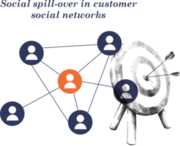No matter how we describe the world we live in, an essential element of it is change, and its triggers can have roots in any area that determines our lives. The last few months have provided many different examples. We have seen an increase in more and more sophisticated cyber attacks, a number of political developments that will let us reflect on the future of taken for granted ties between countries and Google’s virtual assistant, which might make us want to talk to Google. Also, 2017 was a year of extreme weather conditions in many parts of the world, with intense tropical storms, wildfires, and extreme heat.
What do organizations and their leaders here in Qatar and elsewhere in the world need in order to successfully address these and all other changes inside or outside organizations, or to be the driver of productive internal and external change? While research and the popular press provide an extensive list of possible answers, HEC Paris can focus on one area and that is knowledge.
As a member of the Qatar Foundation, we have the great pleasure of supporting its mission to nurture the future leaders of Qatar, and contributing to human development nationally, regionally, and internationally.
Since 2010, we could bring knowledge and develop it locally, which enabled us to educate an extensive amount of current and future leaders in a variety of organizations. This in turn allowed them to face change or to create productive change, for themselves, their teams, their organizations, and for their country. The discussions and sharing of knowledge have taken place in our degree programs at HEC Paris in Qatar, the EMBA and the Strategic Business Unit management master, in custom and open programs. Yet, we did not only engage in the dissemination of knowledge, but a number of professors have also written case studies about organizations in Qatar.
In this issue, we present studies of professors from HEC Paris in the area of business strategy and human resource management. The findings of these studies make some significant contributions to knowledge about change, and changing.
At the beginning, we present research by Giada di Stefano (HEC Paris) and Elena Dalpiaz (Imperial College London) about how the art of storytelling can guide companies through transformative change. Analyzing books that present the development journey of the famous Italian houseware and kitchen utensil company, Alessi, the two scholars demonstrate that leaders should reflect about changes their organizations have to engage in, and then should share this reflection in order to get the buy-in of their internal and external audience.
Decision makers do not only have to address large internal changes, but they are also often confronted with individual level changes such as increased or decreased work efforts. Tomasz Obloj and his co-author have studied the role of envy and compassion for these motivational changes. The authors could successfully show how social comparison (one of the key cognitive processes that allow us to comprehend where we stand relative to others) can be a driver for changes in workplace motivation. They also presented possible ways for managers to address these motivational changes.
Among the different changes mentioned above were climate and environmental changes. Betrand Quélin and his co-authors discuss in the next study the positive financial impact of a firm’s proactive behavior towards the environment. Current and future leaders should try to build on the identified relationships and thereby potentially reduce future climate changes.
As we underline above, knowledge matters. Yet, it does not only allow you to address change; Denisa Mindruta also explains that previous knowledge development can make you attractive as a potential partner to face uncertainty in the future.
Embracing change, one could argue that managers need to consider hiring new employees in order to bring in new ideas, talents, and skillsets. However, the work of John Mawdsley and Deepak Somaya emphasizes the necessity to take a more inclusive and holistic look at human resource management.
All of these studies show HEC Paris’ strong commitment to the development of knowledge. Going forward, we hope that HEC Paris in Qatar can be the majlis of management knowledge with the aim to train current and future leaders and to continue being an active part in the production of management knowledge in Qatar and the region.





















